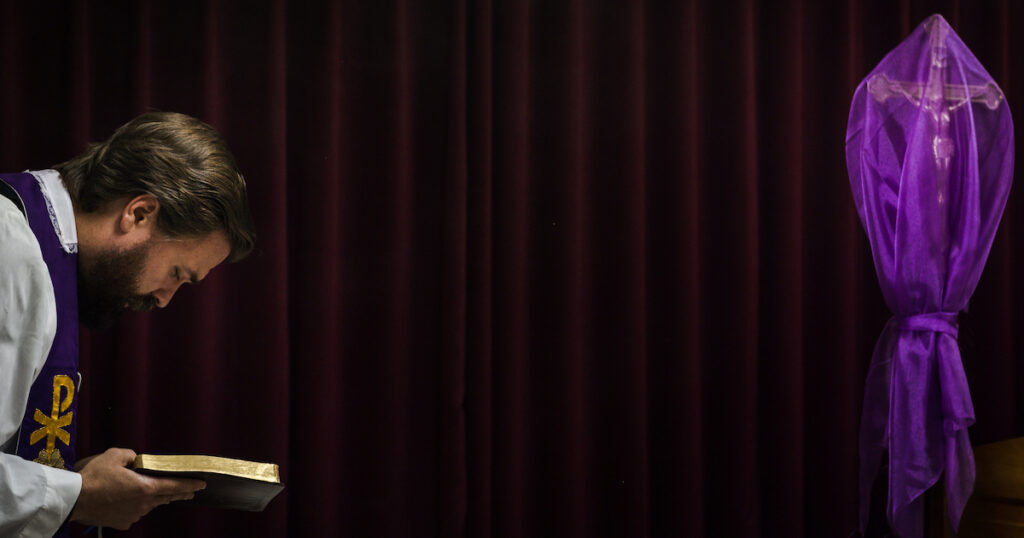An Ancient Sinner’s Prayer
Lord Jesus Christ, Son of God, have mercy upon me, the sinner.
Whence it first arose is a matter of some debate among scholars, but the practice of constantly praying it appears with the so-called “desert fathers” in ancient Christian Egypt, perhaps in the fourth or fifth century. At that time, the church was wrestling with repentance as more than a onetime deal, but that the turning from sin involves a life-long struggle possible only by God’s grace.
The prayer is simple. It calls upon Jesus. It addresses Him both as Lord and Christ, and indeed the Son of God. It asks for but one thing: mercy. Mercy upon me, the sinner.
Son of God
If its historical roots are a bit hidden in the mists of time, the prayer’s biblical foundations are more readily discovered. You hear echoes of the prayer arising from many points. When Jesus asked the disciples who people thought He was, Peter spoke up for the disciples and for us all, “You are the Christ, the Son of the living God” (Matt. 16:16). Lord Jesus Christ, Son of God.
Have mercy
In Matthew 15, we read of the Canaanite woman and her repeated prayer to Jesus: “Have mercy on me, O Lord, Son of David; my daughter is severely oppressed by a demon” (Matt. 15:22). She calls Jesus Lord and Son of David, which is a way of saying “Lord Christ.” Was she trying to pretend she was a Jew by the use of the title? If so, as you know, it didn’t work. Subterfuge never works with Him to whom all hearts are open, all desires known and from whom no secrets are hid. But the pressing need did not let her turn away, no matter how hard His answers. She returned with the invocation: “Kyrie, Lord, help me.” And when He dares even to call her a dog and not a child, she takes what He gives. She doesn’t present her petition because she is worthy; she knows she is not. She says in effect, “Give me the crumbs, the dog’s due.” Lord Jesus Christ, Son of God, have mercy.
Upon me, the sinner
In Luke 18, Jesus tells us of two men who go up to the temple to pray. The great dedication prayer of King Solomon tolls like a bell through the reading: “And when you hear, forgive” (1 Kings 8:30). Yet one man in Luke 18 does not ask for forgiveness or mercy. He tells God how fortunate He must be to have such a servant as himself. In contrast, the tax collector, who would not presume to lift his eyes to heaven, but smote his breast, offered but one little prayer. The ESV renders that prayer: “God, be merciful to me, a sinner!” The Greek, though, doesn’t use the normal “mercy” word we expect, like in Kyrie eleison. Instead, the word is usually linked to God’s propitious attitude; for example, God grant me a sacrifice of atonement. And then, instead of a sinner, he quite literally prayed: THE sinner. As though he were the only one in all the world. Lord Jesus Christ, Son of God, have mercy upon me, the sinner.
St. Paul reminds you that you can count on this truth: that Christ Jesus came into the world to save sinners, and Paul dares to name himself as the chief or foremost of those (1 Tim. 1:15). Sinners do not scare Jesus away. They seem to attract Him, instead. Jesus makes it clear in the Gospels that His proper clients are not those deemed righteous by others or themselves, but sinners, the ones who know the mess they’ve made of their lives and who can only cry for mercy. He was very blunt: “I came not to call the righteous, but sinners” (Matt. 9:13). It is the sinners who repent that bring joy to the angels far more than those who need no repentance (Luke 15:7). And for every last Christian, if we say we have no sin, we’re only lying to ourselves and the truth is not in us (1 John 1:8). Hence, the ancient sinner’s prayer does not merely commence a Christian life (as our evangelical brothers and sisters imagine), but is in fact the constant Christian cry: Lord Jesus Christ, Son of God, have mercy upon me, the sinner.
A bit selfish?
But isn’t that a wee bit selfish, to pray constantly for mercy for yourself? The Canaanite woman sought mercy from Jesus for her daughter (Matt. 15:21–28). The Roman centurion did the same for his servant (Matt. 8:5–13). The despairing father of the epileptic begged Jesus for help for his tortured son (Matt. 17:14–21). The sinner. Franzmann’s great hymn reminds us: “In Adam we have all been one, One huge rebellious man” (LSB 569). John Donne’s famous line: “Send not to know for whom the bell tolls; it tolls for thee.” If intercession means standing with our brother or sister in their need, sorrow, suffering or plight, it is also recognizing our shared need for the mercy of God. And so, this simple prayer is not mere supplication for oneself. It becomes intercession when prayed in the name and the stead of another. Lord Jesus Christ, Son of God, have mercy upon me, the sinner.
Paul observes in Romans 8 that there are times when we simply don’t know how to pray as we ought. When words dry up and our mind is so numb we can’t even form them, we never lack the Our Father, our Lord’s Prayer. We can always take it up and pray it. But also in such moments, this little ancient sinner’s prayer comes into its own. When I don’t know what to ask for, I know that I can still come to Jesus and ask Him for mercy, for myself and for others. Together we are “the sinner.” And I can ask this mercy of Him who chose freely to indeed become THE sinner upon Calvary’s tree, where He who had no sin was made sin for us in order to make us in Him the very righteousness of God (2 Cor. 5:21). Lord Jesus Christ, Son of God, have mercy upon me, the sinner.
God’s name
In the Large Catechism, Luther comments on the Second Commandment that the devil “hates to hear God’s name and cannot remain long where it is spoken and called upon from the heart” (LC I 71), and so Luther urges the godly habit to “always have this holy name in our mouth” (LC I 72). He doesn’t mean in the idle babbling way of just speaking it repeatedly, but of actually invoking it constantly. Calling to the Son of God, our Lord Jesus Christ without ceasing, for mercy. Lord Jesus Christ, Son of God, have mercy upon me, the sinner.
People loved by God, remember this beautiful, fitting addition to praying the Our Father in your personal prayers. Join in this little ancient sinner’s prayer and put it to use in your life. For myself, I am never without need of asking our dear Lord for His mercy both for myself and for others. And is there any greater joy upon this earth than to kneel before Jesus Christ in your heart of hearts and to ask Him for the gift that He died to win for you and lives to bestow upon you? I think not. Lord Jesus Christ, Son of God, have mercy upon me, the sinner.
Listen to a setting of the so-called Jesus Prayer on YouTube:





Fr., you could have at least acknowledged that this prayer is the gift to you from the Eastern Orthodox fathers and is still a common prayer practice amongst both monastics and laity in the Orthodox communion.
Jesus taught us to pray to the Father, as he did himself. Should we be praying directly to Jesus? Or should it be “Dear Lord, in Jesus’ name, have mercy on me”?
I always feel funny about praying to Jesus instead of God. I know they are one in the same as the Triune, but it is still a difficult concept for me, especially since Jesus prayed TO Go himself and taught us The Lord’s Prayer to the Father.
God’s Blessings on you Pastor Weedon!
Thank you so much for a Biblical perspective on this most ancient prayer. In my devotions and searches I have come across The Jesus Prayer several times. Most recently I found chant versions on You Tube and have been playing them in the background during my Morning Prayer.
I was delighted that you incorporated The Jesus Prayer throughout this article. If the article is read with purpose (rather than skimming through it for information) one is not only doing a Bible Study on the prayer but also praying The Jesus Prayer throughout the reading!
Thank you for such wonderful insight into the prayer as well as it’s Biblical roots. Thank you as well for incorporating The Jesus Prayer into the reading and demonstrating a practical use of the prayer.
In Christ,
David
Hello Pastor. As it says in says in Thessalonians “pray without ceasing”. The Eastern Hesychast method of prayer, saying the Jesus Prayer with every breath you take is most interesting. Have you ever read “The Way of a Pilgrim”?
Hi, Matt. Sure, I’ve read that. I’m not sure of all the Hesychast baggage. I mean the uncreated light and all that stuff. But certainly letting the Jesus prayer be the prayer of our body as natural as breathing or the beating of our heart is a blessed practice. Here’s a really good Lutheran book on the prayer: The Jesus Prayer https://www.amazon.com/dp/0281049572/ref=cm_sw_r_cp_tai_YB3CFb4X7TE9G
I have been praying The Jesus Prayer most mornings as I wake up. The only difference in your version is “The” instead of ” I ” as I have been saying. I really like the word The and the different meaning. Thank you. I will try to remember and use The. This is the prayer I often use before my feet hit the floor and it is a great way to start the day!
Thank you so mich, Pastor Weedon!
Thank you Mr Weedon for this article